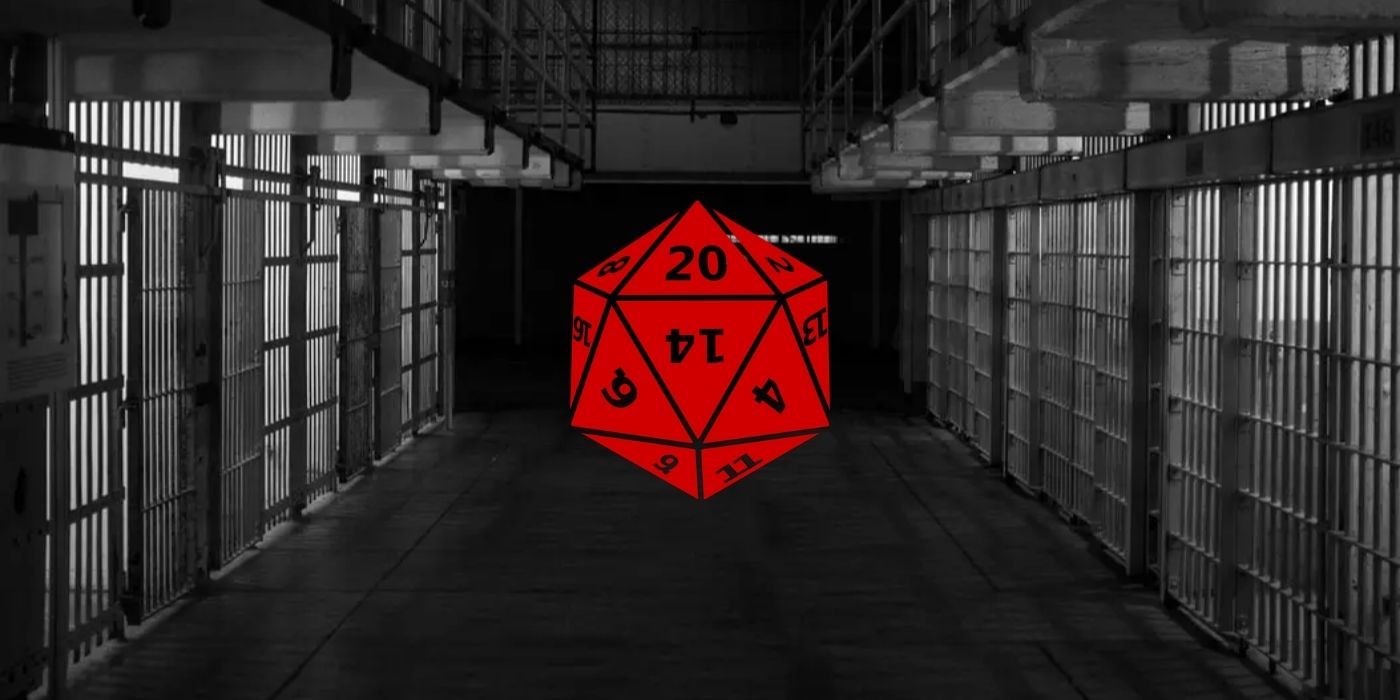Playing tabletop games like Dungeons & Dragons behind bars can be difficult to do, especially depending on the facility one's incarcerated in. Yet oftentimes it can still be done, and with good reason. There are a lot of benefits to this specific group activity that coincides with one of the major goals of all prisons: rehabilitation.
As D&D is, at it's core, a game, many wonder if prisons should reward inmates by allowing them to participate in one. Additionally, since dice are a major part of D&D, many prisons ban them due to their association with gambling, and some facilities also ban the reproduction of dice, dominoes, or anything else that can be used for betting. Some prisons even ban roleplaying games outright. Sometimes security guards or officials not in the know may see a dungeon map and mistake it for some kind prison escape plan. D&D is also commonly - though wrongfully - associated with devil worship or, more accurately, escapism, leaving plenty of reasons for prisons to not allow it.
Yet there are many facilities that encourage games like D&D, and justifiably so. While pretending to be a Wizard or Sorcerer may be viewed solely as a way to escape one's harsh reality - which can happen with tabletop RPGs - there are so many wonderful real world benefits that can come from playing these games. Many correctional programs encourage productive group activities, and there are various articles that discuss how D&D specifically can be advantageous for prisoners on their path to rehabilitation, such as Bryan Richie's Dungeons and Dragons - A Life Changing Experience of Mount Tamalpais College - an institute dedicated to the betterment of prisoners at California's San Quentin State Prison via an Associates of Arts degree program and a College Preparatory Program.
Why Playing Dungeons & Dragons In Prison Should Be Encouraged
Prisons are notorious for racial, ethnic, geographical, and gang-related segregation. Yet there's something special about a D&D table, which tends to open its arms to anyone interested in playing. Richie writes that "[D&D] is regarded by many inmates as one of the few acceptable multicultural social activities in prison," as in this game, "diversity is the key to success." In D&D, players must choose the race and class of their character, and there are certain benefits to having a sundry party of adventures. Furthermore, some D&D races have an inherent disdain for others - such as Dwarves and Orcs - and for inmates to roleplay in a way that stays true to the narrative of the game allows for a different social perspective and the ability to metaphysically live out and address these issues in a healthy, imaginative, and transcendent way, despite a character's alignment. Players are able to put themselves in another's shoes, which increases social empathy and even victim awareness. Richie elaborates that "the differences that segregate people in real life are fundamental to D&D, thereby making cooperative diversity mandatory for game advancement."
In addition to strengthening bonds among inmates, D&D can reward players by finding solutions to problems outside of combat. Using a character's Wisdom, Intelligence, or Charisma modifier, for example, allows for players to succeed through deductive reasoning and diplomatic tactics, which, in turn, can increase cognitive flexibility, decision making, rational thinking, and creative problem solving. In preparation for life on the outside, D&D requires basic math skills, and assists with communication, group problem solving, and research skills. Prisons could implement D&D in an optimized way, letting it be more than just a game but rather a tool for professionals to oversee how inmates react and participate with others. It could be used to enhance the aforementioned skills by providing a means of evaluating them.
While allowing D&D in prisons does "reward" prisoners and gives them a momentary mental escape, this shouldn't be seen as a problem, as this tabletop RPG is an agreeable way for them to hone the kinds of prowess that many rehabilitative programs want them to achieve. Forcing these lessons is less likely to produce the same results as an activity people actually want to engage in would. Authorizing and making Dungeons & Dragons accessible in prisons grants a unique opportunity for inmates to spend their time productively and wisely, and should be viewed more as helpful instrument than a distracting or inappropriate waste of time.
Source: Bryan Richie/mttamcollege


